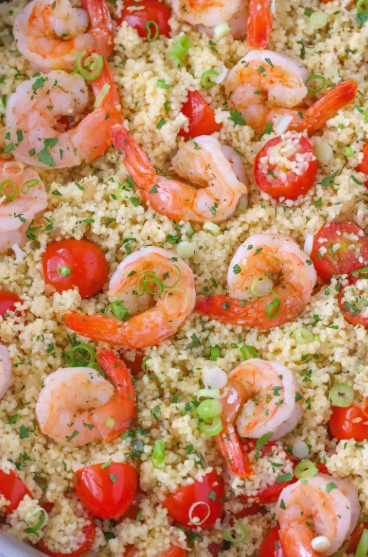
Is Couscous Healthy? Understanding Its Benefits and When to Avoid It
Couscous is a popular staple in many cultures, particularly in Middle Eastern and North African cuisines. It’s a versatile and easy-to-prepare ingredient, often served with stews, salads, or as a base for grain bowls. But with its rise in popularity, many wonder: Is couscous a healthy choice?
In this article, we’ll explore the nutritional profile of couscous, its health benefits, and some potential concerns. We’ll also discuss how it compares to other grains and provide tips for making couscous a more nutritious option in your diet.
What Is Couscous?
Despite often being referred to as a grain, couscous is technically a type of pasta made from semolina wheat. The semolina is mixed with water, rolled into small granules, and then steamed. This results in a light, fluffy texture that’s a common base in many dishes.
There are several types of couscous:
-
Traditional Couscous: Made by hand-rolling semolina and steaming it. This variety is commonly served with stews or as a side dish.
-
Instant Couscous: Pre-steamed and dehydrated, making it quick to prepare but lower in fiber and nutrients than traditional couscous.
-
Whole Wheat Couscous: Made from whole wheat flour, this variety retains the bran and germ, offering more fiber and nutrients than regular couscous.
While couscous is rich in carbohydrates, the nutritional value can vary based on the type. Whole wheat couscous, for example, is a healthier option for those looking to increase their fiber intake.
Nutritional Profile of Couscous
Couscous is a nutritious, carb-rich food. Here’s a closer look at its macronutrient content and key nutrients in a typical 1-cup (157g) serving of cooked couscous:
-
Calories: 176
-
Carbohydrates: 36g
-
Protein: 6g
-
Fat: 0.3g
Compared to other grains, couscous has similar calorie content to rice but is higher in protein than white rice. However, it’s not as high in protein as quinoa, which is considered a complete protein. Couscous is lower in fat, making it a lighter option for those managing calorie intake. When paired with vegetables and lean proteins, couscous can be a healthy addition to a meal.
Key Nutrients in Couscous
-
Selenium: Couscous is a good source of selenium, a powerful antioxidant that supports immune function and thyroid health. One serving of couscous provides about 20% of the recommended daily intake of selenium.
-
Iron: An essential mineral that supports healthy blood circulation and prevents fatigue.
-
B Vitamins: Couscous contains small amounts of B vitamins, which are essential for energy production and metabolic processes.
Whole Wheat Couscous vs Regular Couscous
Whole wheat couscous offers several advantages over regular couscous. It’s higher in fiber, which aids digestion, helps manage blood sugar levels, and supports weight management. Fiber also slows the release of glucose into the bloodstream, making whole wheat couscous a better option for those with diabetes or anyone looking to maintain steady energy throughout the day.
Whole wheat couscous also provides more vitamins and minerals, including B vitamins and iron, which contribute to overall health. If you’re aiming for the most nutritious option, choosing whole wheat couscous is a smart choice.
Is Couscous Healthy or Unhealthy?
Couscous isn’t inherently unhealthy, but its healthfulness depends on the variety you choose and how you prepare it. While couscous offers nutritional benefits, it’s important to consider its drawbacks as well.
Benefits of Couscous
-
Low in Fat: Couscous is naturally low in fat, which makes it a favorable option for people who are trying to manage their weight or reduce fat intake.
-
Good Source of Energy: With its high carbohydrate content, couscous provides a steady energy source, especially when paired with protein and healthy fats.
-
Selenium and Antioxidants: Couscous is a good source of selenium, which plays a key role in immune function and thyroid health. It also helps reduce inflammation in the body.
Drawbacks of Couscous
-
Gluten Content: Couscous is made from semolina wheat, so it’s not gluten-free. This makes it unsuitable for individuals with celiac disease or those with gluten sensitivity.
-
High Glycemic Index: Couscous has a moderate glycemic index, meaning it can cause a spike in blood sugar levels. This may not be ideal for individuals with diabetes or those managing their blood sugar levels.
-
Lower Fiber in Regular Couscous: Unless you opt for whole wheat couscous, regular couscous is low in fiber compared to other whole grains like quinoa or brown rice. Fiber is important for digestive health and blood sugar regulation.
Healthier Ways to Make Couscous
To maximize the health benefits of couscous, consider these tips:
-
Choose Whole Wheat Couscous: Whole wheat couscous is richer in fiber and nutrients, making it the healthier choice. It helps regulate blood sugar and supports digestion.
-
Pair with Vegetables: Add fiber-rich vegetables such as leafy greens, bell peppers, or tomatoes. These vegetables not only increase the fiber content but also provide additional vitamins and minerals.
-
Add Healthy Fats: Incorporate healthy fats, such as olive oil, avocado, or nuts. These will enhance the flavor of couscous and provide essential fatty acids for heart health.
-
Add Lean Proteins: Combine couscous with lean proteins like grilled chicken, fish, tofu, or legumes. This will create a balanced, nutrient-dense meal that supports your health goals.
-
Practice Portion Control: To manage its glycemic impact, control your portion size. Pair smaller portions of couscous with protein and healthy fats to slow the absorption of carbohydrates and keep you full for longer.
FAQs
Is Couscous Healthier Than Rice or Pasta?
When compared to white rice or pasta, couscous—especially whole wheat couscous—is a healthier option because it contains more fiber and protein. However, quinoa is often considered a better choice because it’s a complete protein and lower on the glycemic index.
Can You Eat Couscous on a Low-Carb Diet?
Couscous is not ideal for a strict low-carb diet due to its high carbohydrate content. However, if you’re following a less restrictive carb plan, you can enjoy couscous in moderation. Pairing it with high-fiber vegetables and lean protein can help balance the meal and prevent blood sugar spikes.
Is Couscous Gluten-Free?
No, couscous is made from wheat and is not gluten-free. Those with gluten sensitivities or celiac disease should avoid couscous. Alternatives like quinoa, rice, or gluten-free pasta may be better options.
Is Couscous Good for Diabetics?
Couscous can be included in a diabetic-friendly diet in moderation, especially if you choose whole wheat couscous. Pairing couscous with fiber-rich vegetables, lean proteins, and healthy fats can help regulate blood sugar and prevent spikes.
How Much Couscous Is a Healthy Portion?
A healthy serving of couscous is typically 1/2 to 1 cup of cooked couscous. This portion provides a good amount of carbohydrates without overloading your plate. Pair it with vegetables and lean protein for a balanced meal.
Conclusion
Couscous can be a healthy addition to your diet, especially when you choose whole wheat varieties. It provides energy, essential minerals like selenium and iron, and can support heart health and digestion. However, its gluten content, moderate glycemic index, and lower fiber in regular couscous are important considerations.
By making mindful choices and pairing couscous with nutritious ingredients like vegetables, healthy fats, and lean proteins, you can enjoy it as part of a balanced, healthy diet. Whether you’re seeking a quick meal or a versatile side dish, couscous can fit well into your eating plan with the right preparation and portion control.




